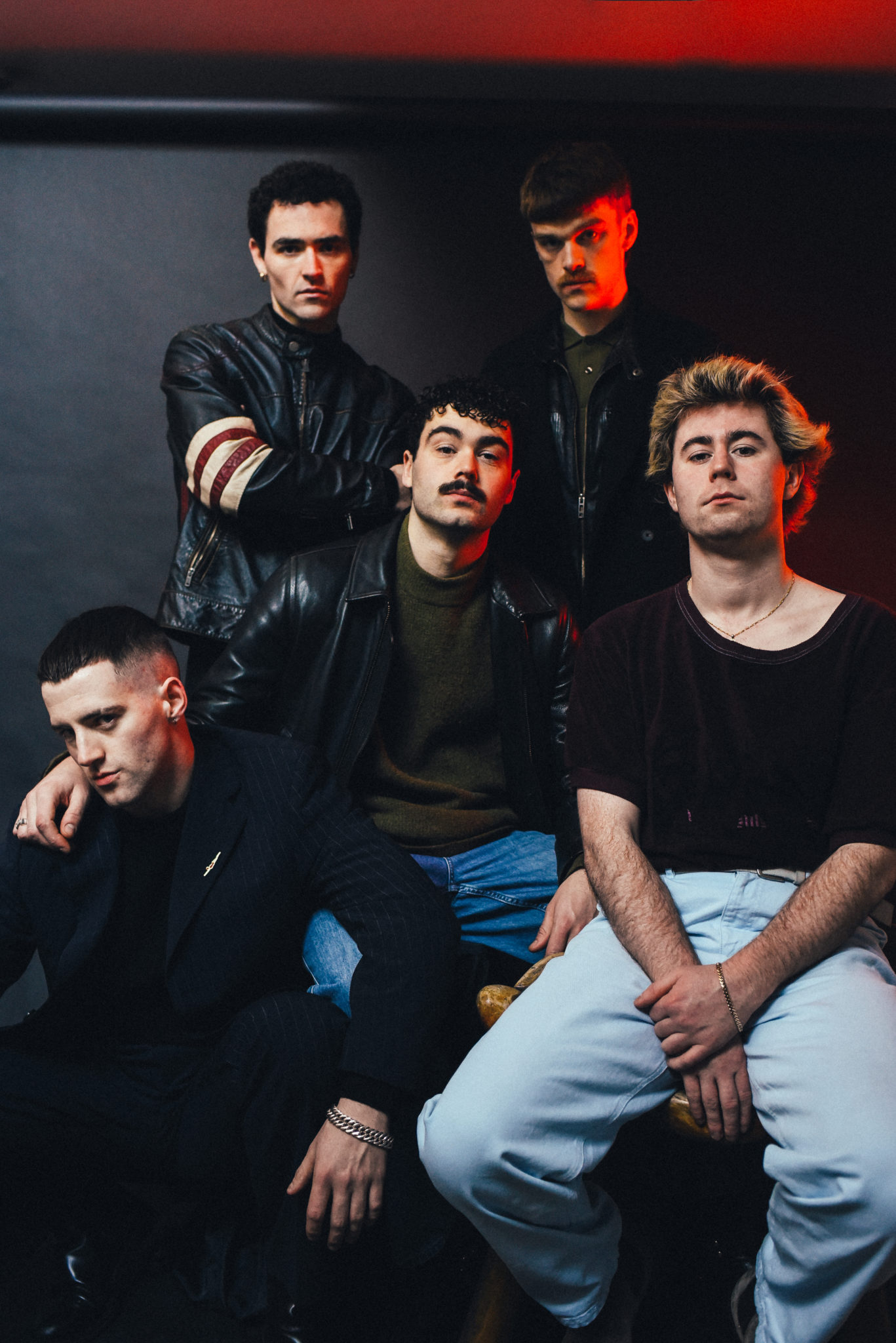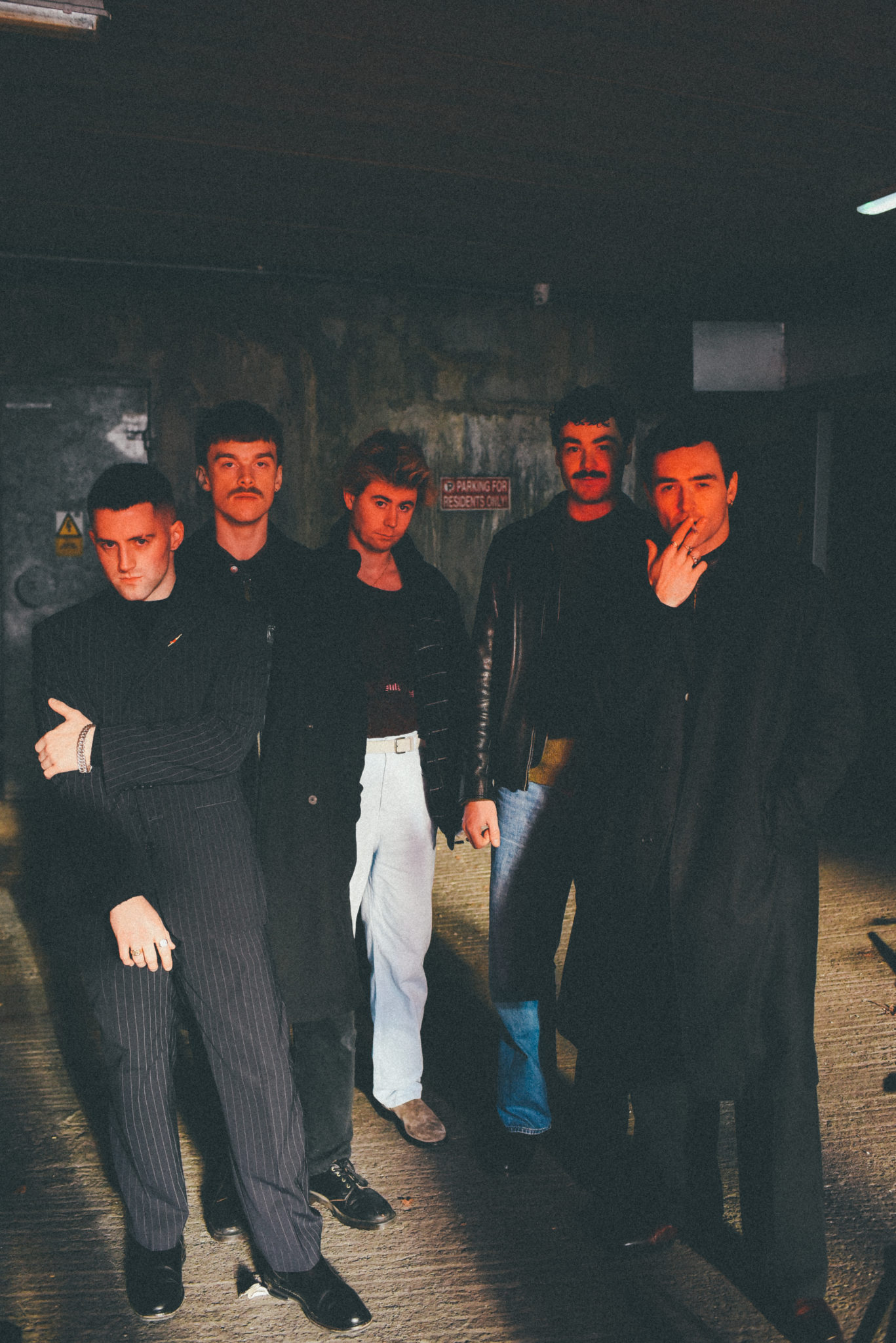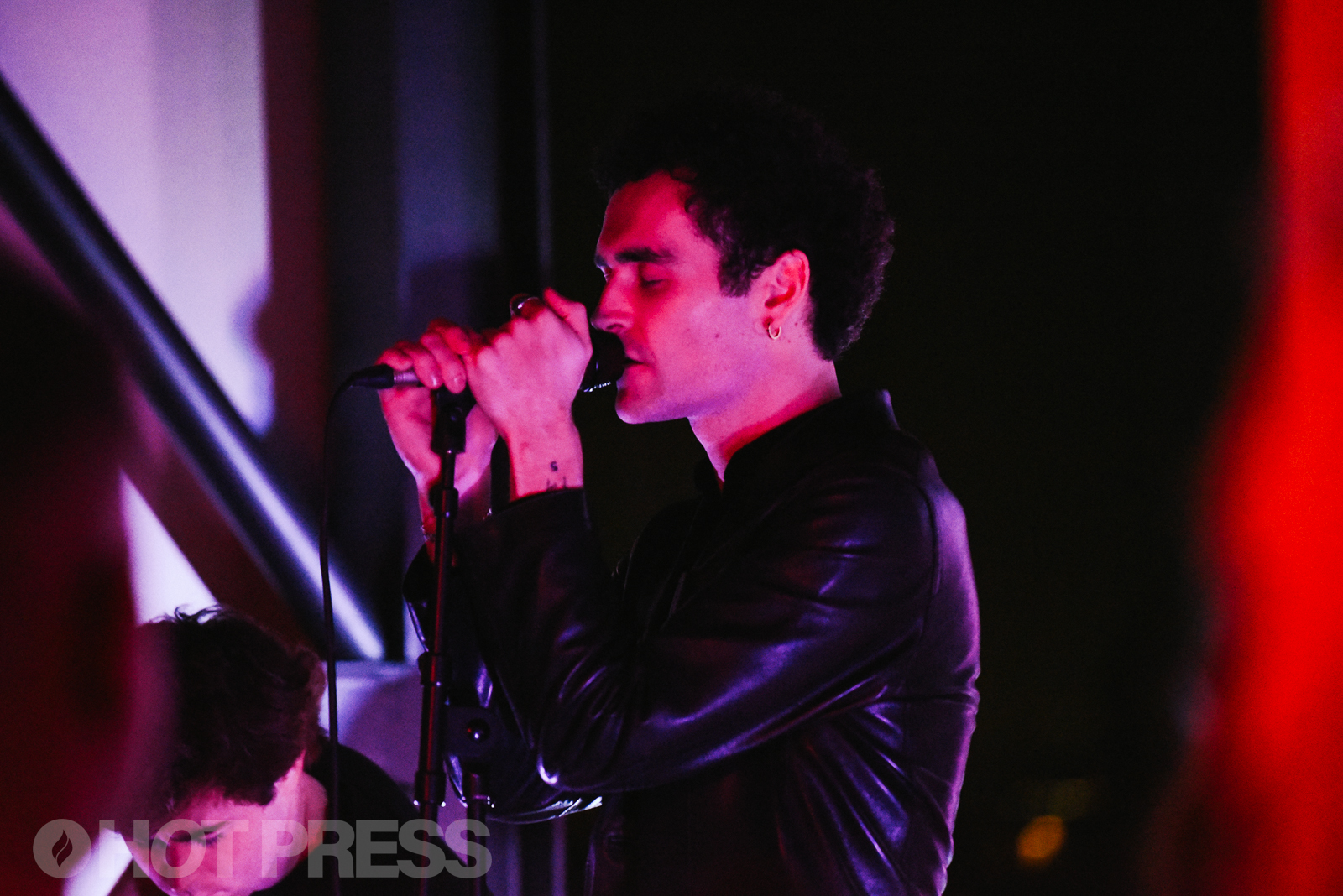- Music
- 04 Mar 24

In the run-up to the Choice Music Prize, we're revisiting the LPs in the running for Irish Album of the Year. Here's our in-depth interview with The Murder Capital – discussing their shortlisted second album, Gigi's Recovery.
Originally published in Hot Press in January 2023:
Grief, as The Murder Capital know better than most, is an ever-evolving thing. Three-and-a-half years ago, the five-piece’s lauded debut album, When I Have Fears, found them in a space shaped by the immediate, all-consuming devastation of death and loss. It resonated powerfully with a fanbase spanning multiple generations at home and abroad, charting at No.2 here, as well as breaking into the Top 20 in the UK.
Now, following a pandemic and two intense years spent writing together across Dublin, Donegal, Wexford and London, The Murder Capital are in an entirely different place, sonically and personally. Gigi’s Recovery, their eagerly awaited follow-up LP, marks a bold step forward for the Irish rock band, as they fearlessly embrace change, colour, and a new multi-faceted world of sound and ideas.
But such significant change doesn’t always happen overnight.
“There was a discomfort at the beginning of writing this record,” lead vocalist James McGovern tells me, sitting in the corner of a Dublin bar, alongside his bandmate, guitarist and keys player Cathal Roper. “The subject matter was so emotionally intense for the first one, and it ended up being fairly similar for the second one – just in a different way.
Advertisement
“There was almost a feeling of imposter syndrome for me, at the start of this record, when writing about anything other than grief and loss,” he continues. “That’s the kind of feeling you get from the shock of unexpected grief – the feeling that nothing else really mattered, except for your relationship with that person. But life moves on, and grief is a process. So at the beginning of writing this record, I was like, ‘Well, what is around us?’”
Of course, with the onset of lockdown, those attempts to look around for inspiration and meaning were slightly complicated for the band – also made up of guitarist Damien Tuit, bass player Gabriel Paschal Blake, and drummer Diarmuid Brennan.

The Murder Capital. Copyright Miguel Ruiz.
“A lot of the writing on this record is about love and the future, as a necessity, to keep ourselves sane,” James says of that time. “And to keep myself optimistic about life in general, by writing about imagined ideas of what life could be.”
For Cathal, it was also important to show the world that there was more to The Murder Capital than many initially realised.
“Even when we were touring the first album, there was an eagerness to get back writing, because we had much more to say than just that side of us,” he reflects. “That’s a thing a lot of people face, when they have that one project out there that represents them. They’re like, ‘I want to show something else – a different side to myself’.”
Advertisement
This approach to Gigi’s Recovery marks a crucial progression for a band who, when emerging in 2018, immediately sparked the type of unbridled buzz that has proven deadly for many a promising, but ultimately unprepared, new act.
But from the outset, The Murder Capital’s drive has been just as impressive as their potential – with a now-legendary gig at the late, great Tivoli Theatre, alongside fellow BIMM Dublin alumni Fontaines D.C. and London band Shame, proving the extent of their powers back in 2018, before they’d officially released their debut single. Not long afterwards, they earned a prime spot on the Hot Press ‘Hot For 2019’ list.

The Murder Capital at Tivoli Theatre, Dublin in 2018. Credit: Nicholas O'Donnell
Alongside their remarkable early success, The Murder Capital were closely impacted by multiple tragedies – including the death of Gabriel’s mother within the first two weeks of recording their debut album, and James’ close friend, Dublin poet Paul Curran, who died by suicide in 2018. Paul’s friendship and legacy also went on to inspire David Balfe’s acclaimed For Those I Love project, which won the Choice Music Prize last year.
“There was so much of that grief and loss for us, as individuals in the band, at the time,” James says. “It really brought us together. This time around, it was more about learning how to trust each other in a creative setting, and it’s a place we got to in the end.”
The secret to building that trust was to disappear into the Irish countryside together for several months at a time during the pandemic.
Advertisement
“We just had each other there, so we projected all our problems, and everything, onto each other,” James recalls. “We really got to know each other – and wiped a lot of each other’s piss off toilet seats!”
While it was by no means their first experience of spending time at close quarters, not having live gigs to focus on turned up the intensity considerably.
“Touring can cover up quite a bit, if you have problems, or things you need to deal with,” Cathal reckons. “You just focus and get the job done. And have fun. You can forget about things. But when you’re put in that pause, you can be like, ‘Oh shit. I have some stuff to deal with here’.”
“Touring is definitely not a place where you deal with anything,” James agrees.
The resulting self-reflection, and the personal crossroads involved, inevitably found their way onto Gigi’s Recovery. The album’s third single, ‘Ethel’, for instance, finds James again ruminating on “imagined ideas of what life could be” – exploring the pivotal decision to pursue genuine happiness over short-lived highs, and settling down to have a child, the titular Ethel.
“There are definitely no babies any time soon!” James laughs now. “But I couldn’t imagine anything more beautiful than having a baby girl. It’s the greatest outcome of love. And it’s more of a selfless existence as well, when you have to look after something.
Advertisement
“I had to change my lifestyle drastically in regards to partying and overindulgence,” he admits. “This track is quite directly about that. I’m in my mid-twenties – by the skin of my teeth! – but it’s this point where everyone’s moving on. They’re moving more into their own bodies, their own selves, and their own lives. For me, my lifestyle just wasn’t sustainable anymore.”
Navigating their twenties together had a profound influence on the entire album.
“Your twenties are fucking crazy,” James smiles. “Every year you look back and think, ‘Who’s that?’”
“You’re an absolute baby the year before,” Cathal nods. “You don’t want to be the year-ago version of yourself, in your twenties, because you’re changing so much.”
“But there’s something beautiful about your twenties too,” James resumes. “You’re so fucking young, but you are wising up to what’s going on around you – which is a position of great power. There’s so much ability to move and change. And you’re still able to change. When you see your parents, and they’re struggling with parts of themselves, you can see that it’s very difficult for them to change. That’s something that we all fear, in old age – being incapable of change. Because that’s when you stop living, in a way.”
As The Murder Capital welcomed change in both their lives and in their music, they turned to new sources of inspiration.
Advertisement
“I was reading a lot of Paul Éluard’s love poems,” James notes. “I was reading them again this morning, actually. They’re just so delicate, and I think there was a real need for that feeling of delicate romance and love – which was obviously completely void in a house of five lads in Wexford. There wasn’t much delicacy – I wasn’t held in the embrace of Gabe at night!”
“I remember we watched Fellini’s 8½ as well,” he continues. “That was a crazy experience.”
“I was really inspired by surrealist visual ideas,” Cathal adds. “You don’t need to be given a context, you’re just presented with something, and it brings a feeling up in you. I found that exciting the whole way through.”

The Murder Capital. Copyright Miguel Ruiz.
Other influences directly impacted James’ vocal style.
“I was listening to a lot of Frank Sinatra at the time,” he recalls. “We all wanted to put more life and colour into the record, and that was my part in that. Even individually, I wanted to be more melodic, and more playful – and just sing more. At that point, I would look at certain songs, like [2019’s] ‘Feeling Fades’ or ‘More Is Less’, and I just could not relate to that guy, because I didn’t feel that way anymore,” he adds. “I couldn’t just shout monotonally down the microphone – though, we did get back to some of that…”
Advertisement
When The Murder Capital first emerged, they were often lumped in with other ‘shouty post-punk’ bands on these shores and beyond. Was that new melodic emphasis a deliberate attempt to break out of that box?
“It’s definitely deliberate,” James confirms. “We like to classify ourselves, loosely, as a rock band now, because that’s so broad, and broad is good. Post-punk can be quite one-dimensional. I guess When I Have Fears is a post-punk record, but is ‘Slowdance II’ a post-punk song? I don’t know. It’s not quite as linear as that. A real part of The Murder Capital is creating records that touch off so many places, atmospherically and musically, within the context of creating a complete narrative.”
“When that post-punk label was coming up, everyone sounded so different that even that seemed like a broad label,” Cathal adds. “But it’s gotten a lot tighter since then. We don’t like working under limitations.”
Although the band gladly shrugged off those labels, the particular sense of hope and emotion they were attempting to capture on the new album wasn’t immediately discernible to everyone.
“We sent on demos, when we had songs at a place where we thought we were ready to go into the studio,” Cathal says. “But how we felt about them wasn’t translating.”
“Management said we’d created a new standard for depression,” James laughs. “That was the email, I think! But where they heard depression, we heard hope and optimism – because we heard everything in them.”
Advertisement
“There were periods of exhaustion for us as well,” he admits. “We didn’t concede anything, but we felt like we might be finished. And then they would push us to say, ‘No, you’re not’. That’s when we moved to London, for six months, to finish writing it.”
Finally, after two long years of writing, the band headed off to La Frette Studios in Paris, to record Gigi’s Recovery with Grammy Award-winning producer John Congleton – who’s previously worked with the likes of St. Vincent, Sharon Van Etten, Regina Spektor, The Staves and Angel Olsen.
“John was a real light at the end of the tunnel for us,” James tells me. “We had figured out a lot of things between ourselves throughout writing this record, but he really put the cherry on top at the end, and got us to a place of trusting each other.
“And he was a real fucking hilarious character,” he adds. “So funny, and so dry. He was a huge character in the evolution of The Murder Capital.”
Having embraced such bold changes in their sound and approach, all that was left to do was share that evolution with the world – and prepare for the reaction from fans. In typical form, the band made a point of not easing their audience into their new world slowly. Instead, they released ‘Only Good Things’ – “the brightest thing on the record”, says James – as the lead single.
“We just felt like, ‘Fuck it – we may as well see how it goes down’,” he reflects. “And there was a lot of backlash from fans, because it was so bright and melodic. But we wanted to do that. And now that we have more singles out, and we’ve been playing acoustic shows, and meeting fans out and about, they’re starting to get the picture. They’re way more on board with the fact that we’re trying to evolve. And that’s exciting them.”
Advertisement
The Murder Capital’s current focus is getting Gigi’s Recovery ready for stages around the world. They kicked off their 2023 tour dates with a string of acoustic in-store performances across Ireland and the UK – something that would have been near-impossible to pull off with When I Have Fears, given the innate heaviness of the material.
“We would've only had two or three tracks that would work,” James says of the acoustic shows. “But it wasn’t even on our minds then. The fact that we’re doing them now is reflective of where the music is at, and where we’re at. There’s a lot more freedom in the feeling within The Murder Capital now. There’s a lot more boundlessness.”
And after the intensity of the past few years, the escapism of life on the road sounds more appealing than ever.
“There’s so much growth, thought and therapy going on in this band that a bit of touring wouldn’t go amiss!” James laughs. “There was a lot of conscious surrender, and just fucking processing going on – as individuals and as a band – that getting out on the road is what we need now. If I could hit the road and go around the world for a year-and-a-half, I would. Honestly.”
“We did acoustic shows there recently,” Cathal adds, “and when you haven’t done a show in a while, you’re like, ‘Oh my God. This is why we do it’. It just ties everything together, and makes you feel normal – hopefully for a few weeks at least!”

Hot Press presents The Murder Capital Live at Aloft Dublin City.
Advertisement
And although Gigi’s Recovery has yet to be unleashed into the world at the time of our conversation, they reveal that ideas are taking shape for Album No.3.
“There might be an album name already…” Cathal smiles.
“There might, actually,” James nods. “I’ve only spoken about it with three of us, so we need to speak to the other two! But I’m still hungry for albums that are conceptual. That hunger hasn’t been fully satiated by this one. If I could get that album title locked in, that would be good – because there’s so much in the title, it would help with building that universe.
“A lot of building a conceptual record has to do with having an overarching idea of what it’s about – and then fucking throwing it away, and living life,” he continues. “And then, things start to seep into that, and you start to correlate these things, like a crime scene investigation wall in a bedroom. Which is what I did for this one. All the song lyrics were up on my bedroom wall, and I would move them around, and try to understand where the linear narrative was. And then we were able to fuck with that narrative.”
The narrative of Gigi’s Recovery is far from straightforward. Instead, like recovery itself, it takes the form of a jagged, uneven journey, framed between the ominous opening song ‘Existence’, and the album’s decidedly more hopeful final track, ‘Exist’.
“It starts with the protagonist in ‘Existence’ so focused on ‘Why am I here? What is this?’ – and stuck in this existential crisis,” James explains. “You end up at ‘Exist’ by just allowing yourself to live. You’re still posing those questions – because I think it’s important that we all ask ourselves ‘why?’ and ‘how?’, and all those things. But at some point we have to just let go of all that stuff. Because nobody knows.”
Listen to Gigi’s Recovery below:
Advertisement
The Album of the Year will be announced at the Choice Music Prize live event this Thursday, March 7, at Vicar Street.










